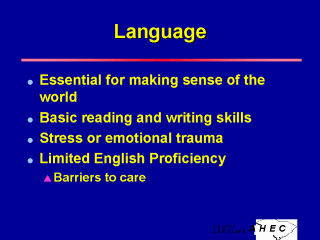| front |1 |2 |3 |4 |5 |6 |7 |8 |9 |10 |11 |12 |13 |14 |15 |16 |17 |18 |19 |20 |21 |22 |23 |24 |25 |26 |27 |28 |29 |30 |31 |32 |33 |34 |35 |36 |37 |38 |39 |review |
 |
Language - Language preference, level of comfort, and proficiency influence how people tend to perceive, trust, understand, develop meaning and make sense of their world. - Lack of basic reading and writing skills in a personís native language (or speaking a language with no written form) greatly increases the difficulty of learning a new language. - In times of significant stress or emotional trauma such as illness or injury, even those who are proficient in English often revert to their native tongue. - Patients with limited proficiency in English can encounter many obstacles to obtaining adequate health care. - Communication difficulties using the telephone may create barriers to access to health care. - Misunderstanding details of referral appointments may decrease the likelihood that patients participate in follow-up care. - The medical interview and history may be incomplete and lead to an inaccurate diagnosis and/or treatment. - Language difficulties may interfere with patient compliance with specialized directions related to diagnostic testing and medications. |
| front |1 |2 |3 |4 |5 |6 |7 |8 |9 |10 |11 |12 |13 |14 |15 |16 |17 |18 |19 |20 |21 |22 |23 |24 |25 |26 |27 |28 |29 |30 |31 |32 |33 |34 |35 |36 |37 |38 |39 |review |